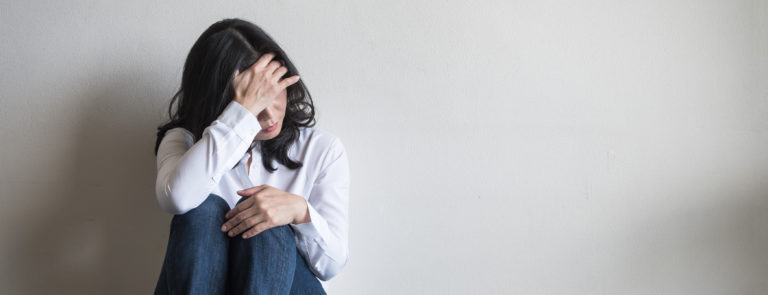20% off €35
Anxiety causes and symptoms

Are you feeling anxious? You’re not alone. An estimated 1 in 6 adults in the UK have experienced symptoms of a common mental disorder like depression or anxiety in the past week, with generalised anxiety disorder (GAD) being the most common.1
What is anxiety?
The NHS defines anxiety as ‘a feeling of unease, such as worry or fear, that can be mild or severe.’2
However, this doesn’t cover the reality of the physical and emotional symptoms which can be disruptive and distressing.
So, anxiety is a response to fear. Historically, this would be fear from an immediate threat or danger.
Nowadays, it’s more likely to be a looking deadline than an attack by wild animals, but the physiological response is the same.
When we’re anxious, our bodies produce cortisol and adrenaline, known as the ‘stress hormones’.3 This isn’t always a bad thing. A little anxiety and stress can keep us alert, focused, motivated and encourage us to make decisions which keep us safe.
However, too much anxiety causes a range of unpleasant symptoms, both physical and psychological. In the case of generalised anxiety disorder, these feelings can get in the way of activities and your enjoyment of daily life.
The physical symptoms of anxiety can include:
- rapid heartbeat
- sweaty hands or feet
- fluttery feeling in chest (caused by heart palpitations)
- dry mouth
- restlessness
- rapid breathing (hyperventilation)
The psychological symptoms of anxiety can include:4
- a sense of dread
- feeling constantly “on edge”
- difficulty concentrating
- irritability
- withdrawing from family, friends or social situations
Who gets anxiety?
There is no typical anxiety sufferer. Absolutely anyone could potentially experience anxiety.
While it’s true that anxiety can have a detrimental effect on your quality of life – it doesn’t mean you can’t also be a successful, outgoing and happy person at the same time.
Although times are changing and open discussion of mental health challenges are becoming more common, having anxiety isn’t always something people choose to broadcast.
Therefore, some of the most outwardly confident people you know could also be dealing with anxiety behind closed doors.
What causes anxiety?
While there are some risk factors and triggers for anxiety, such as a relationship breakdown, bereavement or job interview, sometimes there is no obvious cause.
In fact, nobody is completely clear on the causes of anxiety. Experts think there are several factors at play.
We look at the main known contributors to anxiety.
-
Your genetics
Do any members of your close biological family, such as your parents, experience anxiety? If they do, there’s a greater chance you’ll also experience it at some point.
The genetics of anxiety is an emerging area of study. However, advances are being made and it’s an area of great interest to the medical community due to the high prevalence of anxiety in the world today.
Anxiety is known to be somewhat hereditary, with around 31% of offspring sharing anxiety as a characteristic with their parents according to one study analysis.5
The results of a large USA study published in January 2020 found that people who shared a particular genetic marker often shared anxiety as a common trait.6
-
Your diet
A poor diet high in sugar is known to exacerbate anxiety symptoms. Sugar intake from sweet food and drinks has been strongly linked with common mental disorders such as anxiety and depression.7,8
Though it’s used as a way to relax and unwind, drinking alcohol is a sure-fire way to ramp up anxiety.
Despite being a short-term sedative, as your body works to get rid of the alcohol, you can experience withdrawal symptoms including feelings of anxiety, depression and low mood which can last for several days.9
If you’re experiencing anxiety, you might want to consider your caffeine intake, too. While a morning or afternoon coffee can feel comforting, remember caffeine is a stimulant and will keep your nervous system on high alert.10,11
Ingesting too much caffeine in the form of energy drinks, coffee or even chocolate could cause increased heartbeat, jitters, poor sleeping pattern and a temporary rise in blood pressure – all of which are linked to anxiety.12
-
Your sleep pattern
Disrupted sleep contributes to low mood and anxiety.13 In fact, the link is so strong that the University of Texas found that people with insomnia were up to 17 times more likely to experience anxiety disorders than those who slept normally.14
-
Your lifestyle
The amount that lifestyle factors influence our mental wellbeing shouldn’t be underestimated.
A stressful commute, turbulent relationship or even noisy neighbours can raise your daily stress levels. Even unexpected things such as the amount of time spent on social media can stress us out to the point that we’re more likely to experience anxiety even after we’ve logged off.15
Living a seemingly positive high-stress lifestyle can lead to or worsen anxiety, too. Having a high-powered job, planning events, juggling career and children are all stress-inducing things which are usually associated with a happy and successful life.
This may be true, but living a life filled with constant stress can lead to generalised anxiety over time.
-
Your life experience
Were you always moving schools as a child and having to start friendships from scratch? Was your mother terrified you would run into the road and was hyper-anxious around traffic? Even things such a big, scary dog next door growing up can instil fears and anxieties into the developing psyche.16
There are many researchers who believe that nurture plays a big role in whether people will grow up to be anxious. For example, separation anxiety and social phobias frequently have their roots in childhood.17
If you felt secure and had consistency throughout your childhood, you’re less likely to experience anxiety disorders as an adult.
-
Your gender, age, and overall health
It’s been reported that women are twice as likely to experience anxiety as men.18
Official government statistics indicate that in 2019, 65% of those referred to Improving Access to Psychological Therapies (IAPT) services in the UK were women.19
This could be because men may be less likely to go to their GP or other service about their anxiety. More research into this area is needed.
A 2016 study conducted by the University of Cambridge found that young people and people with chronic diseases were more likely to experience anxiety.20
What causes anxiety attacks?
Anxiety attacks, also called panic attacks, are short-lived episodes of extreme anxiety.
Unlike generalised anxiety, which can be present for days or weeks or more, an anxiety attack only lasts for a short time, between 5-20 minutes.
During this time, you can experience:21
- a pounding or racing heartbeat
- feeling faint, dizzy or light-headed
- sweating, trembling or shaking
- nausea
- chest pain
- trouble breathing
Anxiety attacks are brought on by chronic stress, phobias, hyperventilating (breathing shallowly and rapidly), medication side effects or excessive caffeine intake.22
However, sometimes there is no clear explanation for what has brought on an anxiety attack. Reducing overall anxiety will reduce the risk of experiencing an anxiety attack.
What will cause or worsen anxiety
Some anxiety risk factors, such as your genetics and your gender, are out of your control. However, there are lifestyle factors which we can control.
Take a look at the following list of factors which increase your risk of anxiety, and consider the ones you can change:23
- a diet high in sugar
- drinking alcohol
- drinking lots of caffeine in the form of coffee or energy drinks
- taking on too much at work, or socially
- living with pressures such as debt or a turbulent relationship
- a poor sleep pattern, or lack of sleep
- spending lots of time on social media
Different types of anxiety and the symptoms
Anxiety takes many forms – and it can be useful to identify which type of anxiety you or a loved one may be dealing with. Here’s a run-down of the most common different types of anxiety.
Generalised anxiety disorder (GAD)
GAD is the most common type of anxiety disorder – and like the name suggests, it doesn’t usually have a specific trigger. It is anxiety at a more general level. The main GAD symptom is over-thinking and worrying excessively about events and everyday activities. It may make you feel out of control and cause you to feel anxious, ‘on edge’ and alert to your surroundings a lot of the time.
Experiencing this type of anxiety may negatively affect your day-to-day life. Common issues GAD may affect include your ability to leave the house, travel to places and work. Getting tired easily, trouble with sleep and concentrating are all symptoms, as well as sweating more than usual and experiencing muscle tension. Depression or other anxiety disorders are commonly experienced alongside GAD.
It can be quite hard to get a GAD diagnosis as it doesn’t have some of the unique symptoms of other common anxiety disorders. If you have felt anxious for whatever reason for most days over six months and it has had a negative impact on your life, your doctor will likely diagnose you with GAD.
Please seek the advice of your GP if you think you have GAD. However, if you feel like your anxiety doesn’t necessarily need medical treatment, and may not be a full-blown disorder, here’s some tips on how to deal with anxiety
Panic disorder
Have you ever had a panic attack? People with panic disorder experience panic attacks regularly with no specific trigger.
What is a panic attack?
A panic attack is a type of fear response – they’re an exaggeration of your body’s normal response to stress, danger or excitement.
These frequent panic attacks can come out of nowhere and can be frightening and intense – often causing you to worry about having other panic attacks. It is not to be confused with triggered panic attacks, e.g. you don’t like large crowds and one forms around you for some reason and you have a panic attack – this doesn’t necessarily mean you have a panic disorder.
Here are some common panic disorder symptoms:
- An intense and overwhelming sense of fear or dread
- Chest pain or a feeling that your heart is beating irregularly
- Feeling that your may be having a heart attack or dying
- Hot flushes and sweating, or shivering and chills
- Mouth dryness or a choking sensation
- Dizziness, nausea and feeling faint
- Pins and needles, numbness or a tingling sensation in your fingers
- Needing to go to the toilet more
- Ringing in your ears
- A churning feeling in your stomach
Please seek the help of your GP if you are experiencing this and want help.
Social anxiety disorder
Also known as social phobia, social anxiety (SA) is an intense fear of social / performance situations. It’s normal for everyone to have passing worries about social situations, but when you are fearful of social occasions a lot of / all of the time, it could be social anxiety. Some situations can cause social anxiety before, during and after the event, like:
- Meeting new people or strangers
- Speaking in groups or in public
- Dating
- Drinking and eating in public
One of the main worries for people with SA is that they will embarrass themselves in front of people. This worry can cause physical symptoms like:
- Sweating
- A shaky voice
- A fast heart beat
- Skin blushing
You may also excessively worry about what other people think of you and feel conscious that they can see that you’re embarrassed. This may cause you to avoid certain situations and isolate yourself. You may realise that these fears are excessive, but still find it hard to control this intense worrying.
Please seek the help of your GP if you are experiencing this and want help.
Phobias
A phobia can be about anything, e.g. a place, object, situation, animal or feeling. They are not simply a fear, phobias are much stronger. Phobias develop when people get increased feelings of danger about an object or situation, so much so that they may arrange their daily routine to avoid the thing they have a phobia of. Common phobias include:
- Environmental phobias – like germs and heights
- Animal phobias – like snakes, spiders or rodents
- Body phobias – like being sick or seeing blood
- Sexual phobias – like performance anxiety
- Situational phobias – like going to the dentist
Agoraphobia
People with agoraphobia are afraid of being in situations where they may not be able / it may be difficult to escape, or where they wouldn’t be able to get help if something went wrong. Examples of this are:
- Leaving your home
- Using public transport
- Being in crowded places
- Being in public places
Being worried about these common day-to-day activities can make you feel distressed, anxious and panicked and cause you to avoid certain situations entirely.
Going to see your GP can be difficult if you suffer with agoraphobia. However, you can arrange a telephone appointment with them and they can help you get treatment.
Please seek the help of your GP if you are experiencing this and want help.
Obsessive-compulsive disorder (OCD)
Obsessions and compulsions are separate things that make up OCD.
Obsessions are an uninvited image or thought that you can’t stop thinking about and is mostly out of your control. These difficult-to-ignore thoughts can be disturbing and cause you to feel anxious and distressed.
Compulsions are things you do or think about to relieve anxiety. These behaviours can be hidden, e.g. saying a phrase in you head to calm yourself down, or obvious, e.g. making sure all the windows are locked. It’s common to think that something bad will happen if you don’t do these things, even if you acknowledge that it is not logical, but still find it difficult to stop.
There are many types of OCD, including:
- Checking – the constant urge to check yourself or your environment from damage, e.g. leaks, fire or harm
- Contamination – the need to wash and clean a lot because something or someone is ‘contaminated’
- Hoarding – not being able to throw away worn-out or useless items
- Intrusive thoughts – having uncontrollable upsetting, repetitive and often very disturbing thoughts pop up in your head
Please speak to your GP if you are worried you have OCD and they can discuss potential treatments with you.
Skin-picking
Medically known as dermatillomania skin picking is an impulse control disorder. You find it difficult to stop picking at your skin, even when it is healthy. This can cause bleeding, bruising and sometimes even permanent marks. People generally pick their facial skin, but some also pick other areas of the body and find it difficult to stop.
There is no known cause for picking your skin but it is thought that it could relieve tension and stress or is some sort of addiction. It is quite common to pick your skin and have OCD at the same time.
Your GP may arrange an appointment for you to see a specialist mental health doctor for a diagnosis.
Hair pulling
Another impulse control disorder is hair pulling, aka trichotillomania. If you have no underlying skin conditions which cause you to pull out your hair, but still have the urge then you may be experiencing this disorder. You will feel a strong desire to pull hair from places like your eyelashes, arms, eyebrows, legs or pubic area and find it difficult to stop.
When you pull your hair out, you may be relieving tension, experiencing pleasure or may not even be aware that you are doing it. It’s difficult to stop, so having this disorder long-term can lead to hair loss, and consequently significant distress, guilt and embarrassment.
Please seek the help of your GP if you are experiencing this and want help.
Post-traumatic stress disorder (PTSD)
If you have been feeling anxious and have experienced a traumatic situation, like being in a fire, seeing people die or being sexually assaulted in the past, you could have PTSD. This anxiety can go on for months or years, even if you weren’t physically harmed. Please go and see your GP who can suggest treatment for this condition.
Body dysmorphic disorder (BDD)
If you are upset about the way you look and can’t stop thinking about it, you may be suffering from body dysmorphic disorder. This may manifest in several ways, including:
- Obsessively worrying about a perceived flaw in your physical appearance, when most people cannot see it or do not think it is as nearly bad as you do
- Developing compulsive routines and behaviours, like the excessive use of mirrors, or picking your skin or hair as a way of trying to cope
Many people with this disorder will not seek help as they are worried that they will be perceived as vain. It is not vanity – please see your GP to see how you can treat this disorder.
Last updated: 16 March 2021
- https://www.mind.org.uk/information-support/types-of-mental-health-problems/statistics-and-facts-about-mental-health/how-common-are-mental-health-problems/
- https://www.nhs.uk/conditions/generalised-anxiety-disorder/
- https://www.ncbi.nlm.nih.gov/pmc/articles/PMC4263906/
- https://www.nhsinform.scot/illnesses-and-conditions/mental-health/anxiety#symptoms
- https://www.ncbi.nlm.nih.gov/pmc/articles/PMC5573560/
- https://europepmc.org/article/med/31906708
- https://www.ncbi.nlm.nih.gov/pmc/articles/PMC5532289/
- https://www.ucl.ac.uk/news/2017/jul/high-sugar-intake-linked-poorer-long-term-mental-health
- https://www.healthline.com/health/hangover-anxiety#possible-causes
- https://www.ncbi.nlm.nih.gov/books/NBK202225/
- https://pubmed.ncbi.nlm.nih.gov/1356551/
- https://www.healthline.com/health/caffeine-effects-on-body#2
- https://www.sleepfoundation.org/excessive-sleepiness/health-impact/complex-relationship-between-sleep-depression-anxiety
- https://pubmed.ncbi.nlm.nih.gov/16335332/
- https://www.centreformentalhealth.org.uk/blog/centre-mental-health-blog/anxiety-loneliness-fear-missing-out-social-media
- https://www.ncbi.nlm.nih.gov/pmc/articles/PMC4570859/
- https://www.ncbi.nlm.nih.gov/pmc/articles/PMC5573560/
- https://www.nhs.uk/news/mental-health/women-are-more-likely-to-suffer-from-anxiety-than-men/
- House of Commons Library Briefing Paper Number 6988 January 2020
- https://onlinelibrary.wiley.com/doi/full/10.1002/brb3.497
- https://www.mind.org.uk/information-support/types-of-mental-health-problems/anxiety-and-panic-attacks/panic-attacks/
- https://www.priorygroup.com/mental-health/panic-attack-treatment/causes-of-panic-attacks
- https://www.mind.org.uk/information-support/tips-for-everyday-living/food-and-mood/about-food-and-mood/
- https://www.mind.org.uk/information-support/types-of-mental-health-problems/anxiety-and-panic-attacks/panic-attacks/
- https://mentalhealth-uk.org/help-and-information/conditions/anxiety-disorders/types/
- https://www.mind.org.uk/information-support/types-of-mental-health-problems/body-dysmorphic-disorder-bdd/about-bdd/


.png)
